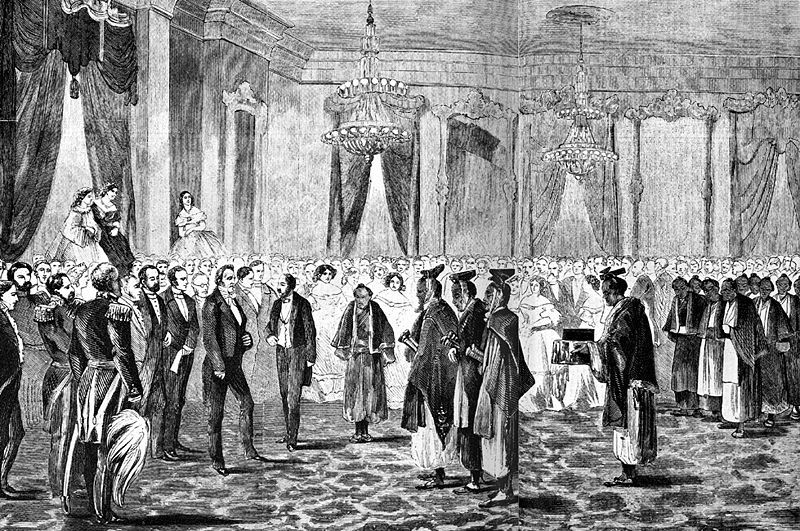This is your morning Open Thread. Pour a cup of your favorite morning beverage and review the past and comment on the future.
 On this day in 1858, the Harris Treaty was signed between the United States and Japan was signed at the Ryosen-ji in Shimoda. Also known as the Treaty of Amity and Commerce, it opened the ports of Edo and four other Japanese cities to American trade and granted extraterritoriality to foreigners, among other stipulations.
On this day in 1858, the Harris Treaty was signed between the United States and Japan was signed at the Ryosen-ji in Shimoda. Also known as the Treaty of Amity and Commerce, it opened the ports of Edo and four other Japanese cities to American trade and granted extraterritoriality to foreigners, among other stipulations.
The treaty followed the 1854 Convention of Kanagawa, which granted coaling rights for U.S. ships and allowed for a U.S. Consul in Shimoda. Although Commodore Matthew Perry secured fuel for U.S. ships and protection, he left the important matter of trading rights to Townsend Harris, another U.S. envoy who negotiated with the Tokugawa Shogunate; the treaty is therefore often referred to as the Harris Treaty. It took two years to break down Japanese resistance, but with the threat of looming British demands for similar privileges, the Tokugawa government eventually capitulated.
Treaties of Amity and Commerce between Japan and Holland, England, France, Russia and the United States, 1858.The most important points were:
* exchange of diplomatic agents
* Edo, Kobe, Nagasaki, Niigata, and Yokohama‘s opening to foreign trade as ports
* ability of United States citizens to live and trade in those ports
* a system of phttp://en.wikipedia.org/wiki/Extraterritoriality extraterritoriality] that provided for the subjugation of foreign residents to the laws of their own consular courts instead of the Japanese law system
* fixed low import-export duties, subject to international controlThe agreement served as a model for similar treaties signed by Japan with other foreign countries in the ensuing weeks. These Unequal Treaties curtailed Japanese sovereignty for the first time in its history; more importantly, it revealed Japan’s growing weakness, and was seen by the West as a pretext for possible colonisation of Japan. The recovery of national status and strength became an overarching priority for the Japanese, with the treaty’s domestic consequences being the end of Bakufu (Shogun) control and the establishment of a new imperial government.


Recent Comments